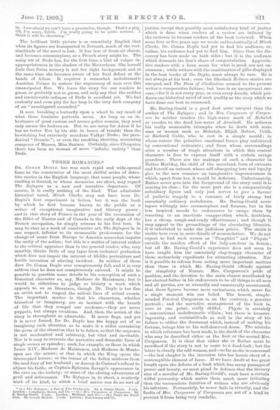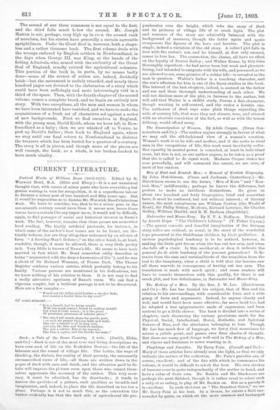THREE ROMANCES.*
DR. CONAN DOYLE has won such rapid and wide-spread fame as the constructor of the most skilful series of detec- tive stories in the English language, that some people, whose reading is limited, or whose memories are short, may regard The Refugees as a new and tentative departure. Of course, it is really nothing of the kind. That admirable historical novel, Micah, Clarice, may not have been Dr. Doyle's first experiment in fiction, but it was the book by which he first became known to the public as a writer of exceptional imaginative and literary power ; and in this story of France in the year of the revocation of the Edict of Nantes and of Canada in the early days of the French occupation, he simply returns to his first love. It may be that as a work of constructive art, The Refugees is, in one respect, inferior to its memorable predecessor, for the change of scene from Europe to America somewhat impairs the unity of the action ; but this is a matter of interest rather to the critical appraiser than to the general reader, who, very sensibly, thinks little of any lapse from technical perfection which does not impair the interest of lifelike portraiture and fertile invention of stirring incident. In neither of these foes Dr. Conan Doyle ever conspicuously fail, and it is very seldom that he does not conspicuously succeed. It might be possible to question some details in his conception of such a historical character as, say, Madame de Maintenon ; but it would be ridiculous to judge as history a work which appeals to us as literature, though Dr. Doyle is too fine an artist not to respect the salient lines of actual events. The important matter is that his characters, whether historical or imaginary, are so instinct with the breath of life that they compel our credence,—they are never puppets, but always creations. And, then, the action of the story is throughout so admirable. It never flags, and yet it is never forced, for Dr. Doyle has the happy art of so imagining each situation as to make it a nidus containing the germ of the situation that is to follow, so that the sequence ie not mechanical and arbitrary, but vital and inevitable. Nor is it easy to, overrate the narrative and dramatic force of single scenes or episodes; such, for example, as those in which Louis XIV., Madame de Maintenon, and Madame de Monte- span are the actors; or that in which the Xing opens the intercepted letters ; or the rescue of the fallen mistress from the mad fury of her husband ; or Amory de Catinat's refusal to abjure his faith; or Captain Ephraim Savage's appearance in the cave on the iceberg ; or some of the closing adventures of peril and deliverance. The Refugees is, in short, a masterly work of its kind, to which a brief notice can do no sort of '4' (10 Thu Befugees : a Tale of Two Cortirtants. By A. Conan Doyle, 3 vols. London Longman% Green, and C10.— (2.) Mrs. Curgenven. of Ourgenven. By S. Baring.Gould. Svole. London Methuen and Co.—(3.) Under the Great Seal. By Joseph Hatton. 3 vols. London 3 Hutchinson and Co.
justice, except that possibly most satisfactory kind of justice which is done when readers of a review are induced by the reviewer to become readers of the book reviewed. When some four or five years ago we wrote enthusiastically of Micah Clarke, Dr. Conan Doyle had yet to find his audience, or, rather, his audience had yet to find him. Since then the dis- covery has been made on both sides ; but it is the audience which demands the lion's share of congratulation. Apprecia- tive readers with a keen scent for what is good, are not un- common ; while writers with the combination of gifts displayed in the best books of Dr. Doyle, must always be rare. He is not always at his best; even the Sherlock Holmes stories are unequal, and The Firm, of Girdlestane seemed to the present writer a comparative failure; but here is an unequivocal suc- cess,—for it is not every year, or even every decade, which pro- duces one historical novel of such quality as the story which we have done our best to commend.
Mr. Baring-Gould is a good deal more unequal than the author of The Refugees ; and in Mrs. Curgenven of Curgen- ven he neither touches the high-water mark of Mehalah or recedes to the dead low-water of Arminell. He achieves his really memorable triumphs when he deals with some man or woman such as Mehalah, Elijah Rebow, Urith, or Richard Cable, who is cast in a simple mould ; in whose nature the primitive emotional forces play unfettered by conventional restraints ; and from whose surroundings arise a number of tragic situations in which this central character is free to express itself with a certain savage grandeur. There are the makings of such a character in Esther Morideg, the child of the moorland, born of outcasts and herself an outcast, whose self-abnegating love and loyalty give to the new romance an imaginative impressiveness in which, apart from her, it would he deficient. Unfortunately, Esther never gets into the foreground of the story until it is nearing its close ; for the most part she is a comparatively subsidiary figure and only just serves to give a flavour of pathetic tragedy to a romance of fairly strong but essentially ordinary melodrama. Mr. Baring-Gould never lapses willingly into commonplace and flatness, but in his less inspired moods he endeavours to escape them by resorting to an inartistic exaggeration which, doubtless, has a cheap, rough-and-ready effectiveness ; and though it may appeal to the groundlings of the circulating libraries, it is calculated to make the judicious grieve. The strain is visible here even in mere details of nomenclature, We do not expect to find such names as " Pamphlet " and " Physic" outside the maiden effort of the lady-amateur in fiction ; but all Mr. Baring-0 ould's experience does not seem to have taught him the essentially clap-trappy character of these melancholy expedients for attracting attention. Nor is it possible to refrain from noting more important matters than those in which Mr. Baring-Gould offends against the simplicity of Nature. Mrs. Ourgenven's pride of position, and the devotion to the main chance manifested by her clerical father in his endeavours to be all things to all men and all parties, are so absurdly and unnaturally accentuated, that these figures become mere caricatures, which never for a single moment win our belief. The honest, simple- minded Percival Curgenven is, on the contrary, a genuine portrait ; and the narrative management of the book is, save at one point, really skilful. Physic is certainly a conventional melodramatic villain; but there is humour, ingenuity, and verisimilitude as well in the story of his failure to utilise the document which, instead of making his fortune, brings him to his well-deserved doom. The mistake to which reference has been made, is the death of the character who may be described either as the first or the second Mrs. Curgenven. It is clear that either she or Esther must be sacrificed if the story is not to come to a dead-look; but the latter is clearly the odd woman, and—so far as she is concerned —the last chapter is the intrusion into her heroic story of a contemptible element of farce. If we have dwelt at too great length upon the defects of a book which has many passages of power and beauty, we must plead in defence that the literary sins of a novelist of Mr. Baring-Gould's rank have a certain wilful perversity which makes them much more irritating than the unconscious fatuities of writers who are obviously his inferiors. Fortunately, he never fails in vivacity, and the faults of Mrs. Curgenven of Curgenven are not of a kind to prevent it from being very readable.
The second of our three romances is not equal to the first, and the third falls much below the second. Mr. Joseph Hatton is not, perhaps, very high up in evt n the second rank of novelists, but his stories have generally a certain agreeable sprightliness. Under the Great Seal is, however, both a shape- less and a rather tiresome book. The first volume deals with the wrongs endured by English settlers in Newfoundland, in the days when George III. was King, at the hands of the fishing Admirals, who, armed with the authority of the Great Seal of England, cruelly evicted the agricultural colonists. This portion of the book is, in parts, by no means badly done—some of the scenes of action are, indeed, decidedly brisk—but the movement is unduly retarded, and nearly three hundred pages are devoted to the elaboration of a story which could have been sufficingly and more interestingly told in a third of the space. Then, with the fourth chapter of the second volume, comes a complete break, and we begin an entirely new story. With two exceptions, all the men and women in whom we have been interested have vanished, and we have to make the acquaintance of a fresh set of characters set against a series of new backgrounds. First we find ourselves in England, with the young man, David Keith, whom we have left in New- foundland as a baby ; then we are whisked oft to Venice, to pick up David's father ; then back to England again, where we stay until our final return to Newfoundland to disinter the treasure which has been buried for a quarter-of-a-century. The story is all in pieces, and though some of the pieces are well enough, the book, as a whole, is too broken-backed to have much vitality.



































 Previous page
Previous page